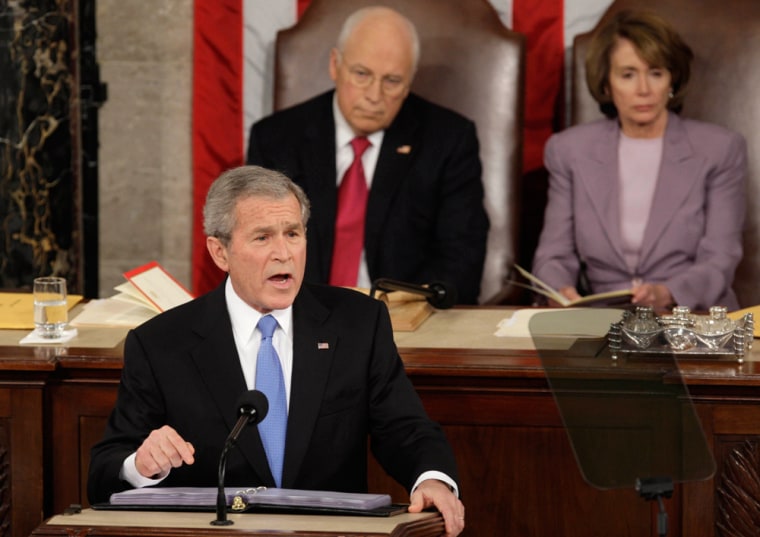The state of the union is anxious.
In the eighth and final year of George Bush’s presidency, Americans have stomach-clenching worries about a recession, soaring fuel costs, huge budget deficits, the war in Iraq, fighting in Afghanistan, a showdown with Iran, global terrorism — the list goes on and on.
It’s a far different world from the one in which Bush first took the oath of office in January 2001. Then the U.S. had a budget surplus, its armed forces were not in active combat and the new president’s approval rating stood above 60 percent.
Now, his approval ratings are near the lowest of his presidency, in the low 30s.
Bush is seldom mentioned on the campaign trail by GOP candidates, who are nonetheless quick to invoke the memory of Ronald Reagan. They make it sound like Reagan was the last Republican president, passing over the terms of both Bush and his father. It seems unlikely the president’s campaigning help will be much in demand this fall.
“I believe they (GOP candidates) feel that the public has made its judgment on Bush, and that judgment is negative and it’s not going to change,” said Stephen J. Wayne, a presidential scholar at Georgetown University.
“We understand the window that we are in,” White House counselor Ed Gillespie said. “The nominees are going to take the spotlight.”
The two major Democratic contenders — Sens. Barack Obama and Hillary Clinton — were in the House chamber to hear Bush’s speech. Republican Sen. John McCain stayed in Florida, where he has been campaigning.
In recent days, Bush has reached out to congressional Democrats on a $150 billion plan to provide tax credits and rebates to an estimated 117 million families, along with tax incentives for businesses to invest in new equipment and plants. The measure is expected to be passed by the House on Tuesday.
“As we meet tonight, our economy is undergoing a period of uncertainty,” the president said in his final State of the Union address. “We can all see that growth is slowing.”
Even though the stimulus bill may face a rockier time in the Senate, the gesture toward bipartisanship was welcome in a capital long torn by partisan acrimony.
It also helped Bush to demonstrate his relevance despite his diminished influence in this year’s presidential contest.
“Any State of the Union address has relevance, because any president, lame duck or not, is still a potent political force in Washington,” said Rich Galen, a Republican strategist who was an adviser to GOP contender Fred Thompson but now is unaffiliated.
“For most people running for president, the easy answer is let’s look ahead and not look back. But George Bush is still the president. One only needs to look at the deal they’re trying to push through on the economy. It has the Bush administration’s fingerprints all over it,” Galen said.
In his speech, Bush urged approval of that legislation as quickly as possible. He also sought to persuade the Democratic-led Congress to make permanent the tax cuts passed during his first term, which are due to expire in 2010, to renew the No Child Left Behind education law, pass a trio of free-trade measures and extend and expand an expiring law that allows warrantless surveillance of terror suspects.
Bush called on Congress to curtail its use of earmarks in appropriations bills to pay for local pet projects — or face vetoes. And he proposed a $300 million initiative to help provide private-school choices for children languishing in struggling inner-city public schools.
Apart from the stimulus package, these are relatively modest legislative goals. The bigger initiatives of Bush’s second term — Social Security and immigration law overhaul — proved unpopular among both Democrats and Republicans and are no longer among the president’s top priorities. He asked lawmakers to come up with their own ideas on these controversies.
Major challenges will dog Bush for his remaining year in office, with high levels of public anxiety. The war in Iraq remains deeply unpopular, with a majority of Americans believing it was a mistake. And while Bush’s decision to increase troop levels seems to have paid off in decreased street violence — “among the terrorists, there is no doubt” it is working, he contended — there is still no clear indication of when sizable numbers of U.S. troops can be brought home.
The fighting is worse now in Afghanistan than it was in January 2002, when Bush asserted in that year’s State of the Union that “our nation is at war, our economy is in recession, and the civilized world faces unprecedented dangers.”
It turns out the recession he was referring to actually ended in November 2001 and that it was a relatively mild one. By contrast, some economists are suggesting the U.S. now could be headed for a deep consumer-led recession, with increasing home foreclosures, continuing difficulty in obtaining credit and skyrocketing gasoline and home heating fuel costs.
“We have unfinished business before us, and the American people expect us to get it done,” Bush said.
It doesn’t seem like it’s a conducive time for Bush to burnish his legacy, something presidents often try in their final State of the Union addresses.
Bush “doesn’t spend a lot of time thinking about that,” his spokeswoman, Dana Perino, said Monday. “The president thinks his legacy will shake itself out when people look at the record, and history will tell.”
That may take awhile, Bush himself suggests. He likes to tell audiences and interviewers that historians are still arguing over the legacy of George Washington, the country’s first president.
EDITOR’S NOTE — Tom Raum has covered Washington for The Associated Press since 1973, including five presidencies.
